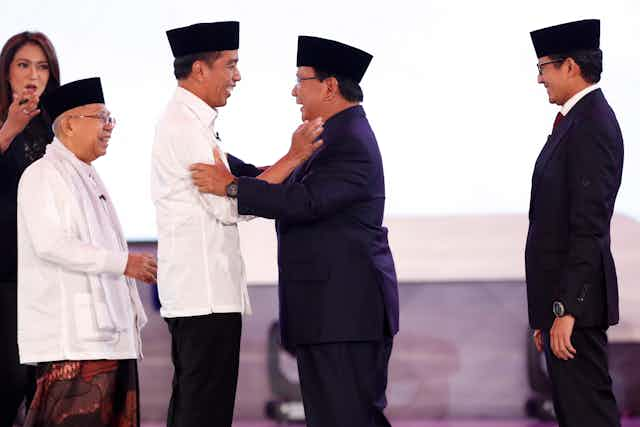Indonesia is one of the most corrupt countries in the world.
The recent presidential debate for the upcoming election raised corruption as one of the topics. Unfortunately, both candidates – Joko “Jokowi” Widodo and Prabowo Subianto – did not offer any new concrete strategies. Both promised to strengthen law enforcement through better coordination between institutions and by improving the welfare of state officials.
But is that enough?
This article analyses the strategies the candidates offered to combat corruption and elaborates the essential things that should have been discussed.
Old and ineffective strategies
Both candidates offered an outdated and ineffective plan to improve the performance of law enforcers.
Jokowi promised to strengthen the Corruption Eradication Commission (KPK) and to improve coordination between the KPK and two other law enforcement institutions, the Attorney General’s Office and the police.
Prabowo said he believed one of the keys to preventing corruption was to increase the salaries of law enforcement and public officials.
Jokowi’s strategy to improve coordination between law enforcement agencies is not new. He had mentioned this in a speech at the annual session of the People’s Consultative Assembly (MPR) in 2017.
Despite this, coordination between institutions is still poor. Corruption cases continued to increase in 2018.
Meanwhile, Prabowo’s suggestion to increase the salaries of public officials, including law enforcers, seems to simplify the issue of corruption.
Prabowo’s strategy stems from the assumption that people commit corruption because they do not earn enough. But the facts show otherwise. Many corruptors are well-paid.
For instance, former Constitutional Court Judge Akil Mochtar, who was found guilty of receiving bribes in relation to local election disputes, earned more than Rp12 billion (US$851,544) during his six-year tenure as chief justice, or Rp2 billion a year.
Such fact is also backed up by theory. According to US management expert Jack Bologna, from Siena Heights University, Michigan, greed is one of the reasons people commit corruption.
Convicted corruptors join the race
During the debate, Jokowi questioned Prabowo’s commitment to eradicating corruption as the party led by Prabowo, Gerindra Party, had nominated corruption convicts in the next election. Jokowi referred to the latest Indonesia Corruption Watch (ICW) report.
Yet the same data also show that the Golkar Party, one of Jokowi’s endorsing parties, has nominated more corruption convicts than the Gerindra Party. ICW data show the Golkar Party has chosen seven legislative candidates with a background as a corruptor. The Gerindra Party has only six.
Prabowo made an unfortunate blunder in his response to Jokowi. For corruption cases committed by his party, Prabowo said he did not mind petty corruption cases. Such a statement certainly raised doubts about Prabowo’s commitment to eradicating corruption in this country.
Missed things
Crucial issues should have emerged in the debate:
1. Political will
Anti-corruption consultant from Singapore Jon S.T. Quah said the government’s political will is crucial for a country to eradicate corruption. This must come from the top leader, the president. The president then must translate this political will into a clear anti-corruption vision, allowing its effectiveness to be measured.
To date, the two candidates have not given a target for when corruption will truly disappear from this country. If that goal is too ambitious, they can start by improving Indonesia’s ranking in Transparency International’s Corruption Perceptions Index. This index aims to rate each country’s level of corruption.
The latest data show that in the past two years Indonesia’s scores have been stagnant at 37. This indicates that Indonesia is still a corrupt country.
2. Protect corruption eradication works
Even though the two candidates planned to improve law enforcers’ welfare, they failed to discuss measures to ensure the protection and security of these officers.
The KPK noted that nine terror attacks have been launched against KPK leaders and investigators in the past four years. No culprits have been found in the assault case against KPK investigator Novel Baswedan. While this case is ongoing, two KPK commissioners, Agus Rahardjo and Laode Muhammad Syarief, have become targets of other attacks.
3. Improve regulation
Indonesia’s Corruption Law is not entirely in line with the United Nation Convention Against Corruption (UNCAC). One element missing from Indonesia’s law is regulation of the private sector, even though the private sector plays a dominant role in developing the economy.
4. Anti-corruption education
Anti-corruption education is essential. Most of our society considers that bribery is common. The latest survey from the Indonesian Survey Institute (LSI) revealed that people in Banten, West Java, still consider corruption a common thing.
It happens due to a lack of public education about corruption. So far, the public considers that the issue of corruption is only KPK’s responsibility. But all elements of society are responsible for ensuring the success of the anti-corruption drive.
If Prabowo and Jokowi had raised the four points above, the quality of debate on corruption could have been better, preventing the two candidates from only focusing on rhetoric and attacking each other.


